A groundbreaking judgement has been delivered by the Supreme Court of India regarding the policy of ‘Institutional Preference’ for Post Graduate Medical Courses. The Court’s decision will impact the admission process for aspiring medical students. This case, involving the University of Delhi and Guru Gobind Singh Indraprastha University, challenges the longstanding practice of giving preference to certain institutions for admissions. The judgement is expected to set a precedent for similar cases in the future.
Facts
- The core issue involved in these appeal/petitions is the policy of ‘Institutional Preference’ for admission to Post Graduate Medical Courses.
- Writ Petition (C) No 1479 of 2018 under Article 32 of the Constitution of India challenges the policy of ‘Institutional Preference’ specifically for University of Delhi and Guru Gobind Singh Indraprastha University.
- The concept of ‘Institutional Preference’ for Post Graduate Medical Admissions is the central point of contention.
- The Gujarat University has framed rules governing admission to Post Graduate Courses under Section 39 read with Section 32 of the Gujarat University Act, 1949.
- Rules 2, 3, 4.1, 4.2, and 4.3 are relevant to the admission process for Post Graduate Medical Courses.
- Preference is given to candidates graduating from Gujarat University as per Rule 4.1.
- After exhausting the merit list prepared under Rule 4.1, candidates graduating from other Universities located in Gujarat State are considered under Rule 4.3.
- Remaining seats, after the initial rules are applied, are filled by the Admission Committee of the University.
- Specific petitions challenge the ‘Institutional Preference’ in Post Graduate Medical Courses.
- The matter has been brought before a larger Bench following a directive from a two Judge Bench of the Court.
- Selection of eligible candidates for seats is done category and status wise based on merit.
Also Read: Address Update Requirement: Legal Implications for Corporate Entities
Arguments
- The petitioners challenge the policy of ‘Institutional Preference’ in Post Graduate Medical Courses.
- They argue that with the introduction of NEET, admissions must be solely based on merit, making ‘Institutional Preference’ impermissible.
- They cite various court decisions to support their stance.
- The petitioners contend that ‘Institutional Preference’ should be limited to 50% of the total state quota seats.
- The respondents argue that ‘Institutional Preference’ has been permissible since 1971 and the petitioners from Delhi should be considered under the state quota.
- The two universities in question have reserved 100% of the state quota seats for their alumni, denying opportunities to other state candidates.
- The MCI Regulations for Post Graduate Admissions do not permit ‘Institutional Reservation’.
- Admission to Post Graduate Medical Courses is based on NEET merit
- 50% seats filled on All India basis, 50% on State-wise basis
- Remaining 50% seats open for State Government/Government Agency
- Institutional Preference held permissible by court decisions
- Source of admissions post uniform NEET entrance not debarred by Section 10D
- NEET test now conducted by National Board of Examinations
- Information bulletin states 50% seats as All India Quota, remaining filled by State Government/Colleges/Universities using NEET-PG score and applicable regulations/criteria
Also Read: Supreme Court Judgement on Maharashtra Prevention of Dangerous Activities Act, 1981
Analysis
- Courts have consistently approved and permitted ‘Institutional Preference’ in Post Graduate Medical Courses since 1971.
- Residence requirement within the State should not be a ground for reservation in post-graduate course admissions.
- A certain percentage of seats may be reserved based on institutional preference, not exceeding 50% of total open seats.
- This reservation can be revised by the Indian Medical Council and should not exceed 50% of total open seats.
- The introduction of the NEET scheme does not affect the permissibility of ‘Institutional Preference’.
- Decision in the case of Saurabh Chaudri (supra) categorically allows ‘Institutional Preference’ up to 50% of total open seats.
- In cases of super specialities like neuro-surgery and cardiology, no reservations should be made based on institutional preference and admissions should be merit-based on an all-India basis.
- Institutional Preference of 50% approved and affirmed by various Court decisions.
- The regulation providing 50% Institutional Preference shall not violate Section 10D of the MCI Act.
- Introduction of NEET does not affect Institutional Preference/Reservation approved by the Court in previous decisions.
- Institutional Preference of 50% of open seats has been approved by the Court in previous decisions.
- Institutional Preference may be reduced to 25% in the State quota.
- Admissions must be based on merits obtained in the NEET examination for both State and institutional reservation quotas.
- NEET was introduced for uniform entrance examinations at the undergraduate and postgraduate levels, solely based on NEET scores.
- Admissions based on NEET scores replaces the previous practice of individual university exams for postgraduate medical courses.
- Introduction of NEET does not impact Institutional Preference as it is unrelated to the NEET scheme.
- The petitioners cannot re-open the issue of Institutional Preference under the guise of the NEET scheme.
Also Read: Illegal Contract Termination: High Court Upholds Arbitral Award
Decision
- Admissions in post graduate courses are based on merits and marks obtained in the NEET examination result only.
- Institutional Preference/Reservation does not override the merit-based admission process.
- The appeals/writ petitions are dismissed with no costs.
Case Title: YATINKUMAR JASUBHAI PATEL Vs. STATE OF GUJARAT
Case Number: C.A. No.-007939-007939 / 2019



